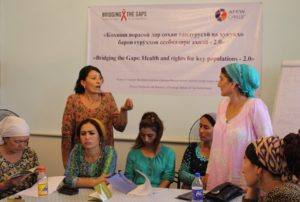One of the main goals of AFEW International and its partners is to improve the health of key populations in society in Eastern Europe and Central Asia. That’s why every story of success from this region is a great stimulus for us! We are happy to share with you a change story from Tajikisan.
Problem
Newly detected HIV cases in Tajikistan increased by 25% in 2010, and there is a growing concern that the prevalent pathway of HIV transmission changed from injecting drugs to sexual transmission. Stigma and discrimination make access to HIV/STI services complicated, contributing to increased risks of HIV.
Activities
Following strong advocacy by AFEW-Tajikistan (in March 2019 AFEW Tajikistan has left AFEW Network and in June 2019 the organization changed its name into Afif) during Bridging the Gaps I, in 2016 the Ministry of Health to allow civil society organisations to introduce rapid TB diagnostic services and free HIV testing next to public testing. This was the first step to increase access to services and treatment for PWUD. In 2017, AFEW-Tajikistan trained five CSOs to set up HIV testing and client management services themselves, and these NGOs now provide free community-based HIV testing services for all key populations. Over the course of 2018, continuous trainings were carried out to the CSOs. In total 7,239 service beneficiaries were reached by NGOs (4312 PWUDs, 520 wives of PWUDs, 234 female sex workers, 96 ex-prisoners and 42 MSMS) and 26 newly cases of HIV were detected (13 cases confirmed and 11 clients on anti- retroviral therapy).
In 2018 AFEW-Tajikistan also added a stronger focus on involvement of community members, by creating and implementing mechanisms for service beneficiaries to provide feedback to the services, including community monitoring of services and involvement of peer consultants.
Key Population Advisory Councils (KPACs) were established in four cities to voice the needs of service beneficiaries. KPACs are voluntary, consultative and advisory groups. The KPACs represent PWUD, people living with HIV, sex workers and former prisoners and vulnerable women. KPACs took part in round tables with representatives of government authorities and openly discussed problems in provisions of health services for key populations, stigma and discrimination, supply of alternatives to breast feeding and the benefits for children living with HIV. These meetings provided a platform for key populations to develop partnerships with governments and demand the services they need.
Change
The expansion of service-delivery for CSOs has led to an increase and testing with positive feedback from service beneficiaries. The concept of “being asked for feedback on your service” is new to Tajikistan and is paying off. In 2018, 85% of all total complaints received were positively resolved. 37 cases of violence of key populations’ rights were documented and further investigated. In 31 cases the rights and/or interests of key populations were restored or defended. Finally, a united mechanism of “complaints” for service beneficiaries was developed, presented and discussed with partner CSOs. The established community advisory councils and communitybased HIV testing points allowed to raise the awareness of key populations’ rights, KPACs became mobilised and empowered to be meaningfully engaged in service delivery and advocacy. Strengthened mechanisms for following up complaints contributes to an integrated and structured system of health services for PWUD.
Key populations report reduced levels of stigma and discrimination from health service providers working in public services in focus groups discussions.1 The services that used to be hard to reach became accessible to them because of community based testing. Waiting times moreover decreased in time.
“I came to this organization with a vast number of problems in my personal life and asked for help, – says Nozigul, member of the KPAC in Bokhtar city. Thanks to AFEW-Tajikistan, I have participated in several trainings and educational events. Later I became a member of the Key Populations Advisory Council. From a helpless woman, I became an active member of society, a woman fighting for the rights of key populations. I am glad that now we can speak openly and evaluate the services provided for us, demand improvement and fight against stigma and discrimination. Our voices are heard, and we see improvement and changes in attitudes towards KPs”.
Bridging the Gaps is an international HIV programme with a focus on the health and rights for LGBT people, sex workers and people who use drugs, currently operating in fifteen countries.




